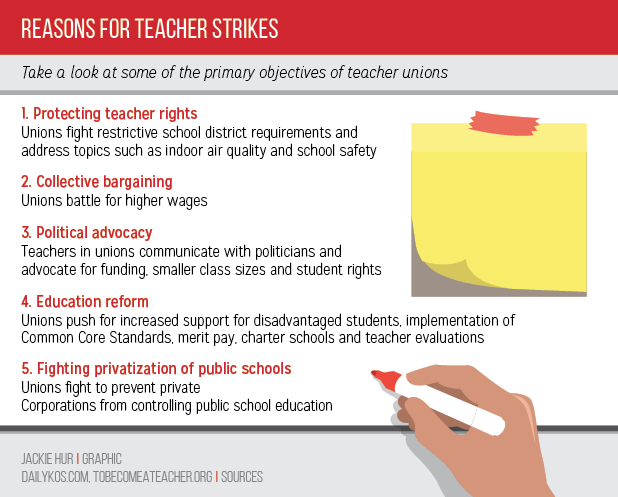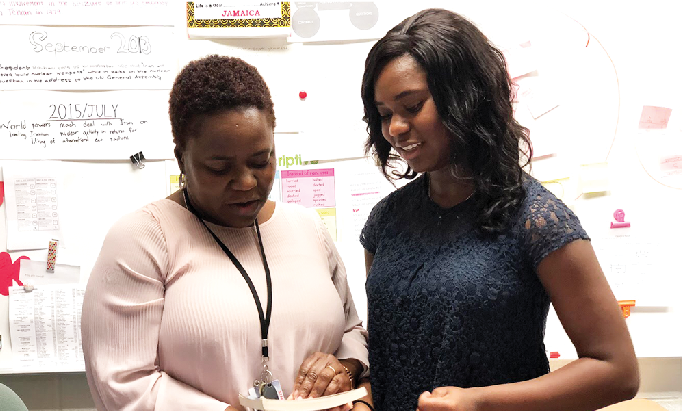On Feb. 9, the Bureau of Labor Statistics announced that there were seven major work stoppages involving 1,000 or more workers in 2017, the second lowest number on record, and none of which included teachers. Less than two weeks later, West Virginia teachers began a nine-day walkout to protest low wages.
Since then, similar teacher strikes and walkouts occurred in Kentucky, Oklahoma, New Jersey, Arizona and Colorado.
According to Teresa Meredith, president of the Indiana State Teachers Association (ISTA), these kinds of teacher protests were very infrequent until about six months ago, when teachers in West Virginia and Oklahoma decided that enough was enough. She said education reforms like funding cuts have taken their toll, leading schools and teachers to speak up.
As the daughter of English teacher Marie Satchivi, junior Audrey Satchivi said she has a unique perspective on the effort teachers here put into their jobs.
Satchivi said, “(Having a mother who is a teacher) makes (the school strikes, walkouts and protests) more personal to me because I see that a lot of the teachers, they do have families, and they’re struggling on those teacher salaries.”
Today, Meredith said the ISTA gets calls and messages everyday from members who are not happy with the current educational system. She said a member called recently and said she was thinking about leaving the profession.
Meredith said, “With the changes that are coming (to evaluate schools and teachers)—not only the graduation pathway changes, but some of the A-to-F changes, some of the letter grade changes are being made there—she’s just feeling overwhelmed. She’s tired of things changing every single year, and she’s frustrated.”
According to Meredith, next year is a school-funding year, in which the legislature will decide what the state’s school funding formula will look like.
“There is a rumble that’s beginning to start,” Meredith said. “It’s the right time to begin talking here in Indiana about what we need and what kind of student support we’re getting.”
Brooke Weisner, daughter of chemistry teacher Sandy Weisner and freshman, said successful teacher strikes have student support in common.
“Students and parents that (support the strikes), make a huge difference because if the parents support it, then the school administration is more likely to listen to it,” she said.
Satchivi, however, said she is not among those students who support the strikes. While she said she believes teachers deserve to strike, she said now may not be the right time.
“The strikes affect more than just the teachers. They affect the students that are out of school, too, and it’s important that the teachers do voice their opinion, but at the same time, they have to take into account that it’s almost the end of the year,” Satchivi said.
Still, she said there is not necessarily a good time for teachers to strike, so success in other states could lead Indiana teachers to protest as well.
However, many state governments, including Indiana’s, do not allow schools to strike.
According to Indiana’s government code, schools will not pay teachers for the days they participate in a strike, and the teachers will lose their dues deduction privilege for one year. Striking is also illegal in West Virginia.
“But in West Virginia, they didn’t strike,” Meredith said. “They walked out. They had administrators who said, ‘We support you. This is not a strike. This is a walkout. We are all in support of this: the community, families. We are going to shut our schools down until something happens because our kids deserve something better.”
However, while teachers say students deserve better, many students say teachers do, too.
“Education is very important. The teachers help bring up the next generation of students or future government officials, presidents, etc.,” Weisner said. “Our parents raise us, but when we go to school, teachers teach us. They help us grow in our learning development.”
Satchivi agreed. She said students do not realize how much time teachers spend creating lesson plans, grading papers and making sure their students are successful.
“(My mom) is always bringing her work home, and that really takes a toll on her sometimes,” Satchivi said. “Be kind to your teachers, and understand that they’re under the same stress that you’re under.”
Weisner said being the daughter of a teacher often gives her a different perspective on certain issues, and it affects the way she reads the news about the teacher protests.
“It’s just kind of hard to see all these teachers doing this and knowing that they’re not getting paid what they really deserve. It’s more like the teachers are supposed to teach the students, but they can’t do that without the help to support themselves, and that’s just a big part of it,” she said.
Funding issues lie at the core of these protests, according to Meredith, although the situation is unique for each state.
She said, “While (Oklahoma schools) had technology, they didn’t have enough technology to meet the needs of all their learners. They didn’t even have enough desks in some cases or chairs that were decent to sit in.”
With such substantial issues, Meredith said it is imperative for people to speak up.
She said, “If those who work in the schools don’t speak up, the taxpayer may not know. Sometimes students will speak up; sometimes they’re a little afraid to. They don’t know who to speak to about what the issue might be, but the adults working in the school certainly do know, and if they don’t speak up, I wonder who will.”
Satchivi said CHS students do not see the extent of these issues, as the school is well-funded, although teachers are not paid differently than teachers outside of this school.
Still, according to Weisner, there are ways to address the issues even if this school is not directly affected by them.
She said, “Just talk about (the issues) more. Talking really makes a difference, even if you can’t really do anything.”
Meredith said acting out is often necessary for change. She said many laws are meant to be changed, so people challenge them and push back against them.
Overall, however, Meredith said education is important, which is why it is so important for schools to engage in civil discourse.
She said, “Education impacts so many people in society. This is how our democracy is able to continue: We educate our students. We hope that they have developed the ability to think independent of things that they’re able to look at an issue from multiple sides and come up with their own view or their own opinion. If that goes away, what happens to our democracy?”

































![AI in films like "The Brutalist" is convenient, but shouldn’t take priority [opinion]](https://hilite.org/wp-content/uploads/2025/02/catherine-cover-1200x471.jpg)









































![Review: “The Immortal Soul Salvage Yard:” A criminally underrated poetry collection [MUSE]](https://hilite.org/wp-content/uploads/2025/03/71cju6TvqmL._AC_UF10001000_QL80_.jpg)
![Review: "Dog Man" is Unapologetically Chaotic [MUSE]](https://hilite.org/wp-content/uploads/2025/03/dogman-1200x700.jpg)
![Review: "Ne Zha 2": The WeChat family reunion I didn’t know I needed [MUSE]](https://hilite.org/wp-content/uploads/2025/03/unnamed-4.png)
![Review in Print: Maripaz Villar brings a delightfully unique style to the world of WEBTOON [MUSE]](https://hilite.org/wp-content/uploads/2023/12/maripazcover-1200x960.jpg)
![Review: “The Sword of Kaigen” is a masterpiece [MUSE]](https://hilite.org/wp-content/uploads/2023/11/Screenshot-2023-11-26-201051.png)
![Review: Gateron Oil Kings, great linear switches, okay price [MUSE]](https://hilite.org/wp-content/uploads/2023/11/Screenshot-2023-11-26-200553.png)
![Review: “A Haunting in Venice” is a significant improvement from other Agatha Christie adaptations [MUSE]](https://hilite.org/wp-content/uploads/2023/11/e7ee2938a6d422669771bce6d8088521.jpg)
![Review: A Thanksgiving story from elementary school, still just as interesting [MUSE]](https://hilite.org/wp-content/uploads/2023/11/Screenshot-2023-11-26-195514-987x1200.png)
![Review: "When I Fly Towards You", cute, uplifting youth drama [MUSE]](https://hilite.org/wp-content/uploads/2023/09/When-I-Fly-Towards-You-Chinese-drama.png)
![Postcards from Muse: Hawaii Travel Diary [MUSE]](https://hilite.org/wp-content/uploads/2023/09/My-project-1-1200x1200.jpg)
![Review: "Ladybug & Cat Noir: The Movie," departure from original show [MUSE]](https://hilite.org/wp-content/uploads/2023/09/Ladybug__Cat_Noir_-_The_Movie_poster.jpg)
![Review in Print: "Hidden Love" is the cute, uplifting drama everyone needs [MUSE]](https://hilite.org/wp-content/uploads/2023/09/hiddenlovecover-e1693597208225-1030x1200.png)
![Review in Print: "Heartstopper" is the heartwarming queer romance we all need [MUSE]](https://hilite.org/wp-content/uploads/2023/08/museheartstoppercover-1200x654.png)




